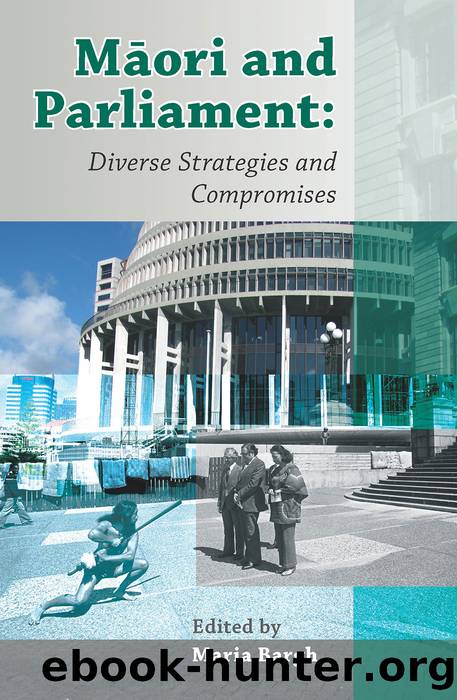Maori and Parliament: Diverse Strategies and Compromises by Maria Bargh

Author:Maria Bargh
Language: eng
Format: epub
Publisher: Huia (NZ) Ltd
MMP, MÄori and Parliament â âexitâ, âvoiceâ and âloyaltyâ
I urge upon you again to do that which is good, for you will have no cause to be anxious if you do so, and if evil arises, then look at it yourselves, and let me look at it also, and let us work together.
Taraha Te Moananui (MP, Eastern MÄori), 4 August 1868
What has MMP brought to MÄori parliamentary politics in terms of the âexitâ, âvoiceâ and âloyaltyâ paradigm?
First, it has offered a strengthened option for âexitâ. When MÄori were aggrieved over the Labour-led Governmentâs decision to legislate in the wake of the court decision regarding New Zealandâs foreshore and seabed, Tariana Turia was able to exit and return to Parliament. Subsequently she and her colleagues were able to win victories in the MÄori seats, providing a parliamentary platform for a distinctive MÄori âvoiceâ.
Second, it made it increasingly important for all political parties to include MÄori candidates among their parliamentary nominees. Moreover, it has made it a practical possibility for them to do so. National and Labour, in particular, are able to bring MÄori into Parliament not by finding âwinnableâ seats for them â as would have been required under first past the post â but by allocating candidates to âelectableâ positions on their partyâs list. Doing so â offering practical, realistic opportunities for parliamentary membership and political influence â reduces motivation for exit from the political process.
Third, MMP has given those articulating strong grievances â opting for voice â reasons for believing that their efforts will not be forever futile. As we have seen following the 2008 general election, would-be governing parties, lacking assured parliamentary majorities, may need MÄori parliamentary support. More broadly, they may also need to be seen by electors, and by the media, as being âreasonableâ â moderate and sensible, inclusive, and not âradicalâ â on âMÄori issuesâ.
Fourth, MMP has also placed increased pressure on MÄori parliamentarians placing other priorities â support for their party, for instance â above articulating MÄori interests. Thus âloyaltyâ, rather than being seen as the only way to successfully represent MÄori â by working within the system, or the Government, or the Labour Party â may now not be seen as necessarily the only practical option to take. At the same time, however, the MÄori Partyâs decision to work with the National Government has meant that its MPs, too, now find themselves in a position in which they now have to contend with competing âloyaltyâ choices â loyalty to their supporters, constituents and principles versus loyalty to the Government that they are committed to sustain in office.
The MÄori PartyâNational Party âpartnershipâ, a truly MMP product, represents more than merely a challenge to the MÄori Partyâs maturity and credibility. It also offers a challenge to National and its leadership. If they can succeed in developing a harmonious, complementary relationship â one that will be genuinely âmana-enhancingâ for both sides â this may initiate a significant rebalancing of MÄori electorsâ political attachments. The MÄori Partyâs
Download
This site does not store any files on its server. We only index and link to content provided by other sites. Please contact the content providers to delete copyright contents if any and email us, we'll remove relevant links or contents immediately.
| Africa | Americas |
| Arctic & Antarctica | Asia |
| Australia & Oceania | Europe |
| Middle East | Russia |
| United States | World |
| Ancient Civilizations | Military |
| Historical Study & Educational Resources |
Machine Learning at Scale with H2O by Gregory Keys | David Whiting(4312)
Never by Ken Follett(3954)
Fairy Tale by Stephen King(3394)
Oathbringer (The Stormlight Archive, Book 3) by Brandon Sanderson(3213)
The Man Who Died Twice by Richard Osman(3077)
Will by Will Smith(2919)
Rationality by Steven Pinker(2363)
Can't Hurt Me: Master Your Mind and Defy the Odds - Clean Edition by David Goggins(2339)
The Dark Hours by Michael Connelly(2307)
Friends, Lovers, and the Big Terrible Thing by Matthew Perry(2230)
The Dawn of Everything: A New History of Humanity by David Graeber & David Wengrow(2208)
Principles for Dealing With the Changing World Order: Why Nations Succeed and Fail by Ray Dalio(2054)
A Short History of War by Jeremy Black(1848)
HBR's 10 Must Reads 2022 by Harvard Business Review(1842)
Go Tell the Bees That I Am Gone by Diana Gabaldon(1757)
A Game of Thrones (The Illustrated Edition) by George R. R. Martin(1744)
Kingdom of Ash by Maas Sarah J(1677)
515945210 by Unknown(1665)
443319537 by Unknown(1556)
